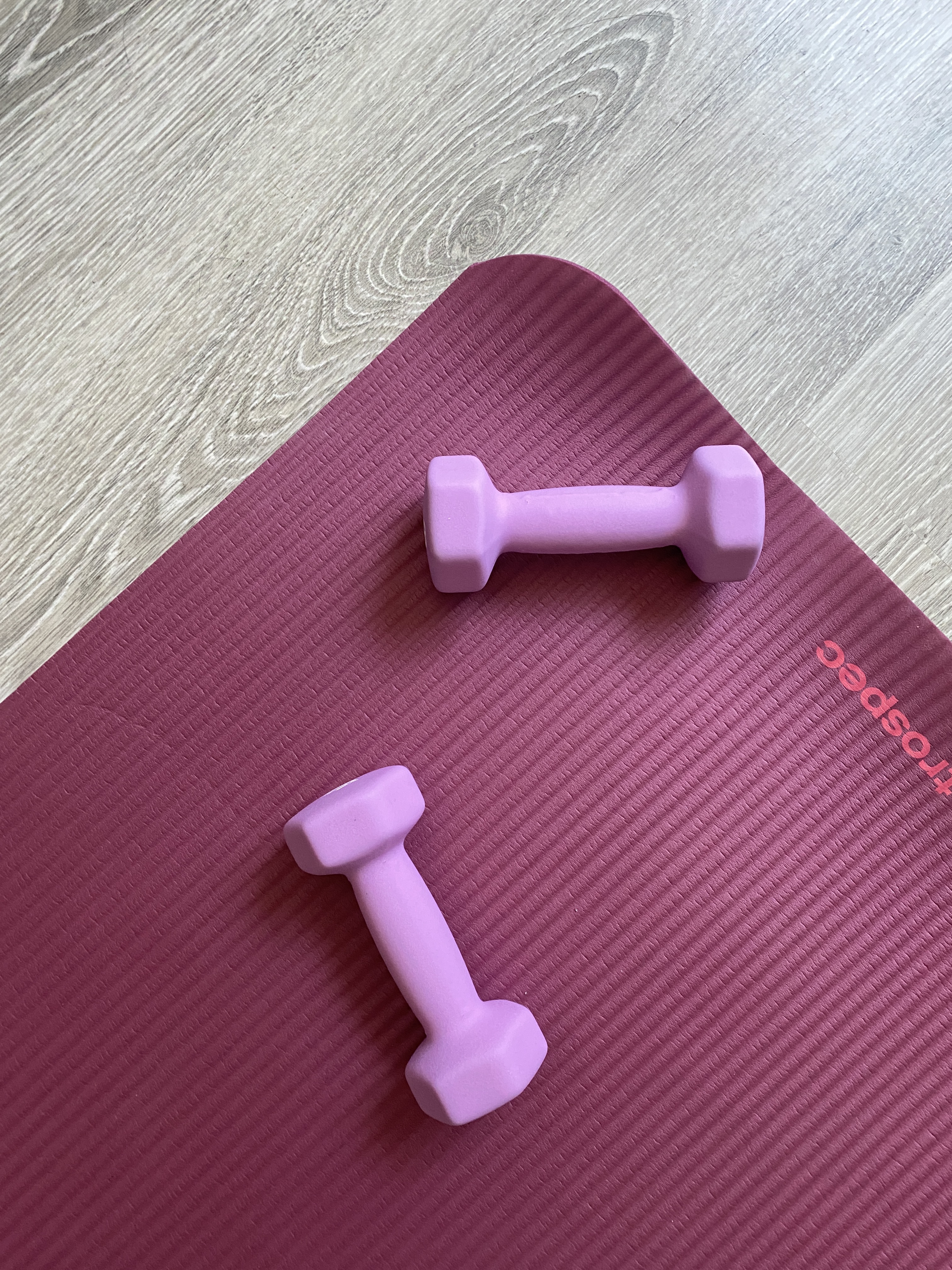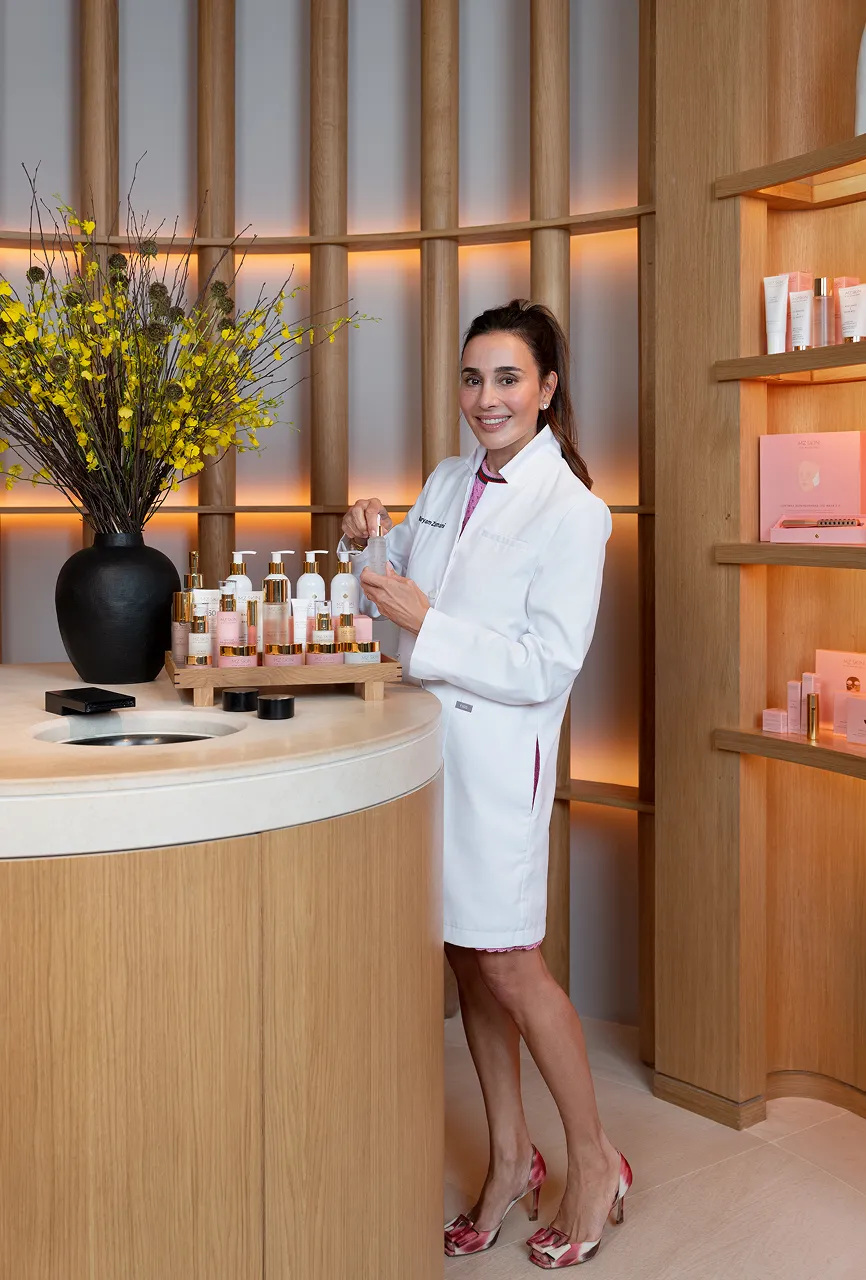Menopausal Skin and the Importance of Muscle and Protein

Dr Maryam Zamani has witnessed firsthand how menopause affects not just her patients' appearance but also their confidence and vitality. The conversations at her Chelsea clinic have evolved significantly in the past few years, since women are no longer accepting decline as inevitable. Instead, they're looking for science-based solutions that address both the visible and invisible changes happening in their bodies.
What Dr Zamani has learned through years of treating menopausal women is this: the key to maintaining youthful skin and a strong, healthy body during this transition isn't found in a single treatment or product. It's discovered through understanding the intrinsic connection between protein, muscle mass, and skin health, and then taking a comprehensive, proactive approach to address all three.
The Menopausal Transformation: What Happens to Your Body
In Dr Zamani's clinic, women in their late 40s and 50s regularly describe almost identical concerns:
"My skin suddenly looks tired and thin," "I'm exercising the same amount but gaining weight around my middle," or "My face looks different, but I can't quite pinpoint why."
These aren't isolated issues; they're interconnected symptoms of the hormonal cascade triggered by declining oestrogen levels.
The Skin Story: Understanding Collagen Loss
What many patients do not realise is that women can lose up to 30% of their collagen in the first five years after menopause. This is why the changes often feel so sudden and dramatic. The period of most rapid decline in skin quality is around the menopause, with the dramatic decline in circulating oestrogen correlating strongly with loss of dermal collagen and contributing significantly to pronounced skin atrophy, dryness and sensitivity, along with decreased elasticity and wrinkle formation.
As someone who works with the delicate periorbital area daily, Dr Zamani sees these collagen changes most prominently around the eyes, where skin is thinnest and most vulnerable. The eyelids become crepey, fine lines deepen into wrinkles, and the supportive structures that once held everything in place begin to weaken. This isn't simply about vanity; collagen is the structural protein that provides skin with its strength, elasticity, and youthful resilience throughout the entire face and body.
The Hidden Muscle Mass Crisis
What surprises many patients is learning that while they're worried about their skin, something equally significant is happening beneath the surface. In the longitudinal Study of Women's Health Across the Nation, lean body mass (muscle) decreased on average by 0.2kg per year. Over a decade, that represents a loss of 2kg of metabolically active muscle tissue.
At the same time, visceral fat, the dangerous type that surrounds internal organs, may increase from 5-8% of total body fat pre-menopause to 15-20% post-menopause. This shift explains why so many women report they're "doing everything right" but still seeing their bodies change in frustrating ways.
Why Protein Becomes Critical During Menopause
When patients visit Dr Zamani with aesthetic concerns, she understands that the conversation must go beyond the treatments offered in clinic. One of the first topics she addresses is protein intake, as the responses often reveal a significant gap in understanding about nutrition during menopause.
The Critical Role of Protein
As we age, our protein requirements increase as our muscles become less capable of using the protein effectively. This isn't just important for athletes or bodybuilders, it's essential for every woman navigating menopause who wants to maintain her strength, mobility, and yes, her skin quality.
The evidence is compelling: In the Women's Health Initiative study, a higher protein intake (1.2 g per kg of body weight) was associated with a 32% lower risk of frailty and better physical function. Many women find they're consuming far less protein than their bodies actually need during this critical period.
Protein's Direct Impact on Skin Health
As a facial aesthetics specialist, Dr. Zamani is particularly interested in how protein supports collagen production. Collagen is the most abundant protein in the body. A fibre-like structure, it plays an integral role in building and maintaining bone and connective tissues such as skin, muscles, cartilage, and tendons.
Through combining clinical experience with the latest research, Dr. Zamani's approach helps patients navigate menopausal changes effectively.
Protein Requirements: The Numbers That Matter
The recommendation for menopausal women is to aim for 1.2 to 1.6g of protein per kilogram of body weight daily, with higher amounts needed for those engaged in regular resistance training. For a 70kg woman, this translates to approximately 84-112g of protein daily.
The body does not store protein, so how we eat it throughout the day makes a significant difference. Aiming for a minimum of 20-25g per meal optimises muscle protein synthesis. This is achievable with both animal and plant-based proteins; the key is consistency and adequate quantity.
Advanced Aesthetic Treatments: Beyond Nutrition
While proper nutrition forms the essential foundation, Dr Zamani offers advanced aesthetic treatments at The Clinic that can accelerate and enhance results, particularly for patients who are already optimising their diet and exercise but want additional support.
- EMSculpt Neo: Addressing Muscle Loss at Its Core
One of the most exciting developments in aesthetic medicine has been EMSculpt Neo for menopausal patients struggling with muscle loss and stubborn fat deposits. This FDA-cleared treatment combines high-intensity focused electromagnetic energy with radiofrequency heating to simultaneously build muscle and reduce fat.
What makes this particularly relevant for menopausal women is that it addresses both primary concerns: muscle loss and increased visceral fat. The treatment induces supramaximal muscle contractions, contractions more intense than what's achievable through voluntary exercise. Clinical studies demonstrate an average 25% increase in muscle mass and 30% reduction in fat after a series of treatments.
This treatment provides powerful support for women who are eating adequate protein and doing resistance training but still struggling with the metabolic slowdown of menopause. It complements their efforts rather than replacing them.
- CoolSculpt Elite: Targeting Stubborn Fat Deposits
The shift toward abdominal fat accumulation during menopause creates stubborn deposits that resist even the most dedicated diet and exercise efforts. CoolSculpt Elite uses controlled cooling to freeze and eliminate fat cells without surgery or downtime.
This treatment works particularly well for the areas women find most frustrating: the abdomen, flanks, and areas where fat distribution has shifted during menopause. By reducing these subcutaneous fat layers, body contours improve, and patients can see the results of their nutritional and exercise efforts more clearly.
- Stimulating Collagen Production: Expert-Level Treatments
Given Dr Zamani's background in oculoplastic surgery and facial aesthetics, collagen stimulation is central to the treatments offered at her clinic. While oral supplementation works systemically, advanced aesthetic procedures can directly target facial collagen production:
- Microneedling with Radiofrequency: This treatment creates controlled micro-injuries while delivering radiofrequency energy to deeper layers, triggering robust collagen production. The results include firmer, more elastic skin with improved texture, addressing the exact changes that occur with declining oestrogen.
- Laser Treatments: Fractional laser resurfacing creates precise zones of controlled remodelling in the skin, stimulating significant collagen production. This can dramatically improve the crepey, thinning skin texture that many menopausal women develop, particularly around the delicate eye area where Dr Zamani specialises.
The Essential Lifestyle Foundation
Dr Zamani emphasises to every patient that advanced aesthetics work best when combined with a solid lifestyle foundation. The most sophisticated treatment cannot compensate for poor nutrition, a sedentary lifestyle, or chronic sleep deprivation.
Resistance Training: The Non-Negotiable Exercise - Weight-bearing exercise is vital during menopause. Combined with higher protein intake, resistance training builds muscle, strengthens bones, improves insulin sensitivity, boosts metabolism, and supports healthy hormone balance.
The Mediterranean Way of Eating - The Mediterranean diet remains the gold standard for menopause health. It focuses on fruits, vegetables, pulses, nuts, seeds, wholegrains, olive oil, and omega-3-rich fish, foods that naturally support hormonal, cardiovascular, and skin health.
Hydration and Sleep: The Overlooked Essentials - Falling oestrogen levels make hydration and sleep more important than ever. Drink plenty of water, use hydrating skincare, and prioritise good sleep — both are key for muscle recovery, collagen production, and hormone regulation.
Book a Consultation
If you're experiencing the physical changes of menopause and want to explore how advanced aesthetic treatments can complement your nutritional and exercise efforts, Dr Zamani and her team invite you to schedule a consultation. Together, you can develop a personalised treatment plan that addresses your unique concerns and goals, combining the latest evidence-based approaches with specialised expertise in facial aesthetics and body contouring.
The transition through menopause is inevitable, but decline is not. With comprehensive support, you can navigate this period successfully and emerge stronger, more confident, and more empowered than ever.
Testimonials
Trustindex rating score: 4.7 of 5, based on 222 reviews
Book Consultation
As a leading Oculoplastic Surgeon with special interest in Facial Aesthetics, Dr. Maryam Zamani has garnered a global reputation - both in the US and UK - for her meticulous attention to detail and sought-after techniques for eyes and facial aesthetics.
Located on the Kings Road, our clinic is easy to reach from Chelsea, Kensington, Belgravia, Knightsbridge, South Kensington, Fulham and Battersea. We are positioned just moments from Sloane Square with excellent transport links across Central and South West London.
- Nearest tube: Sloane Square (District & Circle lines)
- Approx. 5-minute walk
- Multiple bus routes along King’s Road
- Metered on-street parking available on surrounding roads
- Nearby car parks: Duke of York Square & Cadogan Place
- Please allow additional time during peak hours
Accessibility: Please let us know if you require any assistance prior to your appointment, our team will be happy to help ensure your visit is comfortable.
.avif)



